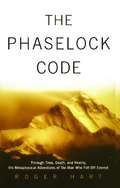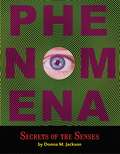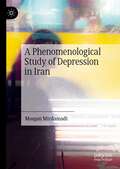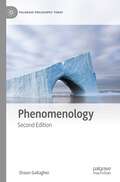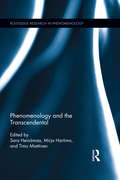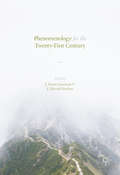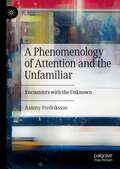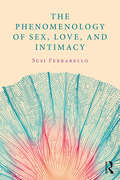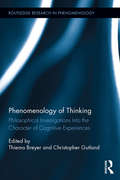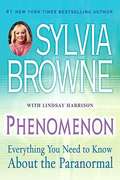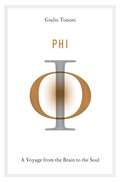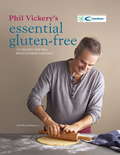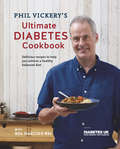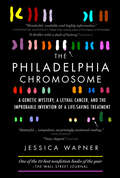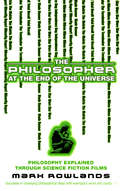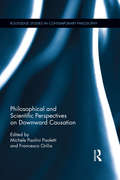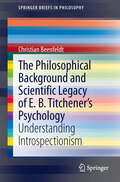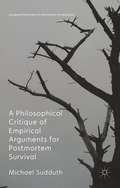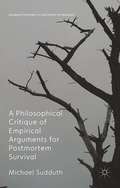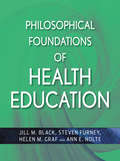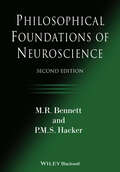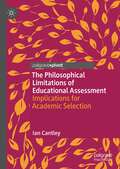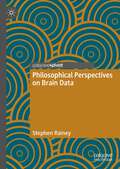- Table View
- List View
The Phaselock Code: Through Time, Death and Reality -- The Metaphysical Adventures of Man
by Roger HartONE MAN'S REMARKABLE SEARCH FOR THE ULTIMATE TRUTHS OF OUR WORLD. For Professor Roger Hart, life truly began after he almost lost his -- in a horrific fall off the slopes of Mount Everest that he miraculously survived. This near-death experience sparked a desire in him to devote his studies to the very nature of human consciousness, in order to unlock the code of reality that binds our world. On an adventure of discovery that would take him around the world, Hart would experience life-altering transcendental events in Tibet, Morocco, and Tierra del Fuego -- opening the door to a true understanding of the nature of man. In this groundbreaking volume, he explores the participation of consciousness in the creation of reality, challenging the traditional scientific view of time, space, and objectivity -- and describing in detail his own metaphysical journey, which has involved synchronicity, precognition, and telekinesis. It is an exploration of the very things that make us human -- and a quest that touches upon the meaning of life itself.
Phenomena: Secrets of the Senses
by Donna M. JacksonCan paranormal experiences help solve crimes?What makes us have chills when we go to a haunted house?Can dogs detect cancer? Your senses send your brain messages. But what do those messages say? Find out how to interpret your senses and explore ways that technology is changing the way we experience the world around us.
A Phenomenological Study of Depression in Iran
by Moujan MirdamadiThis book is an investigation into cultural variations in experiences of depression. Examining first-person accounts of depressed persons in Iran alongside similar previously studied data from the UK, the book highlights the cultural shaping at the heart of variations in experiences, manifestations, and articulations of depression. The analyses presented appeal to some of the longstanding pillars of Iranian culture, such as folk theories and literature, as well as the dominant social influences, like the Iran-Iraq war and the Islamic revolution. A central claim made, therefore, is that contrary to the universalising approaches in psychiatry, a better understanding of the workings of mental illness is achieved by situating individuals and their experience in a meaning-making sociocultural context.
Phenomenology (Palgrave Philosophy Today)
by Shaun GallagherWith a focus on phenomenological methods, this new edition of Shaun Gallagher’s highly regarded textbook provides a comprehensive introduction to phenomenology considered as a philosophical and interdisciplinary practice. Phenomenology 2e encompasses both the classic 20th century explications of phenomenology as well as recent developments in the practical and scientific uses of phenomenology.Key features: Explores debates about naturalizing phenomenology and reviews recent extensions of phenomenological methodology. Relates the phenomenological analysis of intentionality to discussions of enactive perception. Includes a discussion of the phenomenology of performance and a new chapter on critical phenomenology. Examines specialized topics in phenomenology, including Husserl’s concept of hyletic data, embodiment, time-consciousness, action, intersubjectivity and self-consciousness. Each chapter concludes with suggestions for further reading. This book is essential reading for all undergraduate and graduate philosophy students taking courses in phenomenology. It is also ideal for use on cognitive science modules that incorporate a phenomenological perspective.
Phenomenology and the Transcendental (Routledge Research in Phenomenology)
by Sara Heinämaa Mirja Hartimo Timo MiettinenThe aim of this volume is to offer an updated account of the transcendental character of phenomenology. The main question concerns the sense and relevance of transcendental philosophy today: What can such philosophy contribute to contemporary inquiries and debates after the many reasoned attacks against its idealistic, aprioristic, absolutist and universalistic tendencies—voiced most vigorously by late 20th century postmodern thinkers—as well as attacks against its apparently circular arguments and suspicious metaphysics launched by many analytic philosophers? Contributors also aim to clarify the relations of transcendental phenomenology to other post-Kantian philosophies, most importantly to pragmatism and Wittgenstein’s philosophical investigations. Finally, the volume offers a set of reflections on the meaning of post-transcendental phenomenology.
Phenomenology for the Twenty-First Century
by J. Aaron Simmons and J. Edward HackettThis volume illustrates the relevance of phenomenology to a range of contemporary concerns. Displaying both the epistemological rigor of classical phenomenology and the empirical analysis of more recent versions, its chapters discuss a wide range of issues from justice and value to embodiment and affectivity. The authors draw on analytic, continental, and pragmatic resources to demonstrate how phenomenology is an important resource for questions of personal existence and social life. The book concludes by considering how the future of phenomenology relates to contemporary philosophy and related academic fields.
A Phenomenology of Attention and the Unfamiliar: Encounters with the Unknown
by Antony FredrikssonBuilding on the thriving discussion on the role of attention within the phenomenological tradition, from Aron Gurwitsch and Merleau-Ponty to Bernhard Waldenfels, this book investigates the enigmatic role of attention as a faculty that enables change within subjective and intersubjective experience. The aim of the book is to reveal some characteristics of the processes in which subjects are unmade and remade, and to highlight how we are able to change our relation to an empirical world that nevertheless has unity and constancy in our perception.
The Phenomenology of Sex, Love, and Intimacy
by Susi FerrarelloThe Phenomenology of Sex, Love, and Intimacy presents a phenomenological exploration of love as it manifests itself through sexual desires and intimate relationships. Setting up a unique dialogue between psychology and philosophy, Susi Ferrarello offers a perspective through which clinicians can inform their practice on diverse issues of human sexuality. Drawing on Husserl’s phenomenology, Ferrarello’s analysis of love spans a range of disciplines including psychology, theology, biology, epistemology, and axiology, as well as areas related to gender, consent, and political control. Combining Husserlian perspectives on ethics with a focus on lived-experience, this text will deepen therapists’ understanding of love as the subject of interdisciplinary inquiry and enable them to locate questions of sexuality and intimacy within an academic framework. With key theoretical principles included to allow clinicians to think through and clarify their practice, this book will be a valuable tool for sex therapists, marriage and family therapists, and counselors, as well as psychology and philosophy students alike.
Phenomenology of Thinking: Philosophical Investigations into the Character of Cognitive Experiences (Routledge Research in Phenomenology #4)
by Thiemo Breyer Christopher GutlandThis book draws connections between recent advances in analytic philosophy of mind and insights from the rich phenomenological tradition concerning the nature of thinking. By combining both analytic and continental approaches, the volume arrives at a more comprehensive understanding of the mental process of "thinking" and the experience and manipulation of objects of thought. Contributors scrutinize aspects of thinking that have a common grounding in both the phenomenological and analytic tradition: perception, language, logic, embodiment and situatedness due to individual history or current experience. This collection serves to broaden and enrich the current debate over "cognitive phenomenology," and lays the foundations for further dialogue between analytic and continental approaches to the phenomenal character of thinking.
Phenomenon: Everything You Need to Know About the Paranormal
by Sylvia Browne Lindsay HarrisonIn this compelling new book, bestselling author Sylvia Browne offers her most comprehensive guide to the afterlife. Phenomenon is a fascinating compendium of all things on the Other Side that influence our life here on Earth. Sylvia Browne provides evocative stories and powerful explanations to help make life on the Other Side real for all of us. In Phenomenon, she provides reassuring answers to questions such as: Atlantis - Where did it go and when will it return? Clairvoyance - How do you know if you have the gift? Deja vu - Are past lives the answer to this strange phenomenon? Ghosts - What are they? Miracles - Can they happen every day? Reincarnation - Have we lived before? Sorcery - Is there something we should fear? Zombies - Are they only in horror movies? An easy-to-use reference full of hope and guidance, Phenomenon is sure to have wide appeal among Browne's loyal fans and anyone in search of signs of the paranormal.
Phi: A Voyage from the Brain to the Soul
by Giulio TononiThis title is printed in full color throughout.From one of the most original and influential neuroscientists at work today, here is an exploration of consciousness unlike any other--as told by Galileo, who opened the way for the objectivity of science and is now intent on making subjective experience a part of science as well. Galileo's journey has three parts, each with a different guide. In the first, accompanied by a scientist who resembles Francis Crick, he learns why certain parts of the brain are important and not others, and why consciousness fades with sleep. In the second part, when his companion seems to be named Alturi (Galileo is hard of hearing; his companion's name is actually Alan Turing), he sees how the facts assembled in the first part can be unified and understood through a scientific theory--a theory that links consciousness to the notion of integrated information (also known as phi). In the third part, accompanied by a bearded man who can only be Charles Darwin, he meditates on how consciousness is an evolving, developing, ever-deepening awareness of ourselves in history and culture--that it is everything we have and everything we are. Not since Gödel, Escher, Bach has there been a book that interweaves science, art, and the imagination with such originality. This beautiful and arresting narrative will transform the way we think of ourselves and the world.
Phil Vickery's Essential Gluten Free
by Phil VickerySince Phil Vickery published his first gluten-free book in 2009, the number of people opting to go gluten-free has risen dramatically - 13% of the UK population now say they avoid gluten; in Finland the number of coeliacs has more than doubled in 20 years and in Italy it has doubled since 2007. A notoriously restrictive diet, it can seem the end of exciting food, but Phil uses his Michelin-starred cooking talents and simple, honest ingredients to create dishes that everyone in the family can eat - including the pizza, bread, pasta, cakes and biscuits that you thought you would never enjoy again. The 175 delicious recipes take their inspiration from cuisines around the world and range from Lasagnette with Asparagus and Tomatoes to Easy Pad Thai Noodles and American-style Pancakes with Pears and Almonds.
Phil Vickery's Essential Gluten Free
by Phil VickerySince Phil Vickery published his first gluten-free book in 2009, the number of people opting to go gluten-free has risen dramatically - 13% of the UK population now say they avoid gluten; in Finland the number of coeliacs has more than doubled in 20 years and in Italy it has doubled since 2007. A notoriously restrictive diet, it can seem the end of exciting food, but Phil uses his Michelin-starred cooking talents and simple, honest ingredients to create dishes that everyone in the family can eat - including the pizza, bread, pasta, cakes and biscuits that you thought you would never enjoy again. The 175 delicious recipes take their inspiration from cuisines around the world and range from Lasagnette with Asparagus and Tomatoes to Easy Pad Thai Noodles and American-style Pancakes with Pears and Almonds.
Phil Vickery's Ultimate Diabetes Cookbook: Supported by Diabetes UK
by Phil VickeryWinner - Gourmand World Cookbook Awards: Best World Gourmand Cookbook Health and Nutrition 2017 Being diagnosed with Type 2 Diabetes needn't mean an end to enjoying food. In his bestselling gluten-free cookbooks, Phil Vickery showed it's possible to overcome dietary restrictions and still eat well. Now he's turned his attention to creating recipes that will help diabetics take control of their diet and lower their blood sugar levels, with the endorsement of Diabetes UK. Organised into Breakfasts, Light Bites, Soup & Lunch, Main Meals, Sweet Things & Drinks and Sides & Dressings, the recipes are accompanied by nutritional analysis and at-a-glance `traffic light' labelling. They include delicious dishes such as Squash, Feta & Hazelnut Salad and Roast Butterfly Chicken with Pomegranate, Lemon, Garlic & Mint, and cakes and desserts such as Banana Pinenut Cake and Easy Chocolate Mousse. With advice on achieving (and maintaining) a healthy weight, practical tips on eating less refined carbohydrates, smaller portions, and nutrient dense ingredients, Phil makes eating sensibly easier and more appealing than ever.
Phil Vickery's Ultimate Diabetes Cookbook: Delicipis Recipes To Help You Achieve A Healthy Balanced Dite
by Phil VickeryWinner - Gourmand World Cookbook Awards: Best World Gourmand Cookbook Health and Nutrition 2017 Being diagnosed with Type 2 Diabetes needn't mean an end to enjoying food. In his bestselling gluten-free cookbooks, Phil Vickery showed it's possible to overcome dietary restrictions and still eat well. Now he's turned his attention to creating recipes that will help diabetics take control of their diet and lower their blood sugar levels, with the endorsement of Diabetes UK. Organised into Breakfasts, Light Bites, Soup & Lunch, Main Meals, Sweet Things & Drinks and Sides & Dressings, the recipes are accompanied by nutritional analysis and at-a-glance `traffic light' labelling. They include delicious dishes such as Squash, Feta & Hazelnut Salad and Roast Butterfly Chicken with Pomegranate, Lemon, Garlic & Mint, and cakes and desserts such as Banana Pinenut Cake and Easy Chocolate Mousse. With advice on achieving (and maintaining) a healthy weight, practical tips on eating less refined carbohydrates, smaller portions, and nutrient dense ingredients, Phil makes eating sensibly easier and more appealing than ever.
The Philadelphia Chromosome: A Genetic Mystery, A Lethal Cancer, And The Improbable Invention Of A Lifesaving Treatment
by Jessica WapnerOne of The Wall Street Journal’s 10 Best Nonfiction Books of the Year Philadelphia, 1959: A scientist scrutinizing a single human cell under a microscope detects a missing piece of DNA. That scientist, David Hungerford, had no way of knowing that he had stumbled upon the starting point of modern cancer research— the Philadelphia chromosome. It would take doctors and researchers around the world more than three decades to unravel the implications of this landmark discovery. In 1990, the Philadelphia chromosome was recognized as the sole cause of a deadly blood cancer, chronic myeloid leukemia, or CML. Cancer research would never be the same. Science journalist Jessica Wapner reconstructs more than forty years of crucial breakthroughs, clearly explains the science behind them, and pays tribute—with extensive original reporting, including more than thirty-five interviews—to the dozens of researchers, doctors, and patients with a direct role in this inspirational story. Their curiosity and determination would ultimately lead to a lifesaving treatment unlike anything before it. The Philadelphia Chromosome chronicles the remarkable change of fortune for the more than 70,000 people worldwide who are diagnosed with CML each year. It is a celebration of a rare triumph in the battle against cancer and a blueprint for future research, as doctors and scientists race to uncover and treat the genetic roots of a wide range of cancers.
The Philosopher At The End Of The Universe: Philosophy Explained Through Science Fiction Films
by Mark Rowlands'It's Schopenhauer and the will. It's Plato, it's Hume, Baudrillard and the concept of the Nietzschean superman!' Keanu Reeves on The MatrixThe Philosopher at the End of the Universe allows anyone to understand basic philosophical concepts from the comfort of their armchair, through the plots and characters of spectacular blockbusting science-fiction movies. Learn about: The Nature of Reality from The Matrix; Good and Evil from Star Wars; Morality from Aliens; Personal Identity from Total Recall; The Mind-Body Dilemma from Terminator; Free Will from Minority Report; Death and the Meaning of Life from Blade Runner; and much more. As someone once said, things must be said and knowledge known, and the cast list assembled to tell us does not disappoint: Tom Cruise, Plato, Harrison Ford, Immanuel Kant, Sigourney Weaver, Friedrich Nietzsche, Keanu Reeves and Rene Descartes. From characters in the biggest films (with lots of explosions and bad language) to Ludwig Wittgenstein (no explosions and too much language in general), hear all the arguments. I think, therefore... I'll be back!
Philosophical and Scientific Perspectives on Downward Causation (Routledge Studies in Contemporary Philosophy)
by Michele Paolini Paoletti Francesco OriliaDownward causation plays a fundamental role in many theories of metaphysics and philosophy of mind. It is strictly connected with many topics in philosophy, including but not limited to: emergence, mental causation, the nature of causation, the nature of causal powers and dispositions, laws of nature, and the possibility of ontological and epistemic reductions. Philosophical and Scientific Perspectives on Downward Causation brings together experts from different fields—including William Bechtel, Stewart Clark and Tom Lancaster, Carl Gillett, John Heil, Robin F. Hendry, Max Kistler, Stephen Mumford and Rani Lill Anjum —who delve into classic and unexplored lines of philosophical inquiry related to downward causation. It critically assesses the possibility of downward causation given different ontological assumptions and explores the connection between downward causation and the metaphysics of causation and dispositions. Finally, it presents different cases of downward causation in empirical fields such as physics, chemistry, biology and the neurosciences. This volume is both a useful introduction and a collection of original contributions on this fascinating and hotly debated philosophical topic.
The Philosophical Background and Scientific Legacy of E. B. Titchener's Psychology
by Christian BeenfeldtThis volume offers a new understanding of Titchener's influential system of psychology popularly known as introspectionism, structuralism and as classical introspective psychology. Adopting a new perspective on introspectionism and seeking to assess the reasons behind its famous implosion, this book reopens and rewrites the chapter in the history of early scientific psychology pertaining to the nature of E. B. Titchener's psychological system. Arguing against the view that Titchener's system was undone by an overreliance on introspection, the author explains how this idea was first introduced by the early behaviorists in order to advance their own theoretical agenda. Instead, the author argues that the major philosophical flaw of introspectionism was its utter reliance on key theoretical assumptions inherited from the intellectual tradition of British associationism--assumptions that were upheld in defiance of introspection, not because of introspection. The book is divided into three parts. In Part I, British associationism is examined thoroughly. The author here discusses the psychology of influential empiricist philosophers such as Thomas Hobbes, John Locke, David Hume, David Hartley, James Mill, and John Stuart Mill. In Part II of the book, Titchener's introspectionist system of psychology is examined and analyzed. In Part III, the author argues that Titchener's psychology should be understood as a form of associationism and explains how analysis, not introspection, was central to introspectionism.
A Philosophical Critique of Empirical Arguments for Postmortem Survival (Palgrave Frontiers in Philosophy of Religion)
by Michael SudduthA Philosophical Critique of Empirical Arguments for Postmortem Survival.
A Philosophical Critique of Empirical Arguments for Postmortem Survival (Palgrave Frontiers in Philosophy of Religion)
by Michael SudduthSudduth provides a critical exploration of classical empirical arguments for survival arguments that purport to show that data collected from ostensibly paranormal phenomena constitute good evidence for the survival of the self after death. Utilizing the conceptual tools of formal epistemology, he argues that classical arguments are unsuccessful.
Philosophical Foundations of Education (9th Edition)
by Howard A. OzmanNow in its ninth edition, Philosophical Foundations of Education provides readers with comprehensive knowledge about the various schools of thought that have comprised the philosophy of education throughout history. Highly readable, this chronological text gives insight into the individuals who helped develop various philosophies of education and provides historical information about how they lived and how they learned. In addition, each chapter covers each philosophy’s aims, methods, curriculums, teaching roles, advantages, and disadvantages. Covering not only how each philosophy evolved over time but also how these philosophies influenced subsequent educational practice, this popular textbook also challenges readers to apply what they have learned in their own profession and develop their own philosophies about education, instruction, and schooling.
Philosophical Foundations of Neuroscience
by M. R. Bennett P. M. HackerThe second edition of the seminal work in the field—revised, updated, and extended In Philosophical Foundations of Neuroscience, M.R. Bennett and P.M.S. Hacker outline and address the conceptual confusions encountered in various neuroscientific and psychological theories. The result of a collaboration between an esteemed philosopher and a distinguished neuroscientist, this remarkable volume presents an interdisciplinary critique of many of the neuroscientific and psychological foundations of modern cognitive neuroscience. The authors point out conceptual entanglements in a broad range of major neuroscientific and psychological theories—including those of such neuroscientists as Blakemore, Crick, Damasio, Dehaene, Edelman, Gazzaniga, Kandel, Kosslyn, LeDoux, Libet, Penrose, Posner, Raichle and Tononi, as well as psychologists such as Baar, Frith, Glynn, Gregory, William James, Weiskrantz, and biologists such as Dawkins, Humphreys, and Young. Confusions arising from the work of philosophers such as Dennett, Chalmers, Churchland, Nagel and Searle are subjected to detailed criticism. These criticisms are complemented by constructive analyses of the major cognitive, cogitative, emotional and volitional attributes that lie at the heart of cognitive neuroscientific research. Now in its second edition, this groundbreaking work has been exhaustively revised and updated to address current issues and critiques. New discussions offer insight into functional magnetic resonance imaging (fMRI), the notions of information and representation, conflict monitoring and the executive, minimal states of consciousness, integrated information theory and global workspace theory. The authors also reply to criticisms of the fundamental arguments posed in the first edition, defending their conclusions regarding mereological fallacy, the necessity of distinguishing between empirical and conceptual questions, the mind-body problem, and more. Essential as both a comprehensive reference work and as an up-to-date critical review of cognitive neuroscience, this landmark volume: Provides a scientifically and philosophically informed survey of the conceptual problems in a wide variety of neuroscientific theories Offers a clear and accessible presentation of the subject, minimizing the use of complex philosophical and scientific jargon Discusses how the ways the brain relates to the mind affect the intelligibility of neuroscientific research Includes fresh insights on mind-body and mind-brain relations, and on the relation between the notion of person and human being Features more than 100 new pages and a wealth of additional diagrams, charts, and tables Continuing to challenge and educate readers like no other book on the subject, the second edition of Philosophical Foundations of Neuroscience is required reading not only for neuroscientists, psychologists, and philosophers, but also for academics, researchers, and students involved in the study of the mind and consciousness.
The Philosophical Limitations of Educational Assessment: Implications for Academic Selection
by Ian CantleyThis book uses philosophical analysis to argue that there are tensions associated with using results of high stakes tests to predict students’ future potential. The implications of these issues for the interpretation of test scores in general are then elucidated before their connotations for academic selection are considered. After a brief overview of the history of academic selection in the United Kingdom, and a review of evidence pertaining to its consequences, it is argued that the practice of using the results of contemporary high stakes tests to make important decisions about students incurs logical and moral problems that a conscientious educator cannot ignore. The gravity of the moral transgression depends on the purpose and significance of the test and, in the case of high stakes tests used for academic selection purposes, it is argued that, not only can the moral wrong be highly significant, but better solutions are within reach.
Philosophical Perspectives on Brain Data
by Stephen RaineyWhere there is data there are questions of ownership, leaks, and worries about misuse. When what’s at stake is data on our brains, the stakes are high. This book brings together philosophical analysis and neuroscientific insights to develop an account of ‘brain data’: what it is, how it is used, and how we ought to take care of it. Emerging trends in neuroscience appear to make mental activity legible, through sophisticated processing of signals recorded from the brain. This can include Artificial Intelligence (AI), with algorithms classifying brain signals for further processing. These developments will have ramifications for concepts of the brain, the self, and the mind. They will also affect clinical practices like psychiatry, by modifying concepts of mental health and introducing AI-based diagnostic and treatment strategies. The issues arising are vastly complicated, little understood, but of high importance. Philosophical Perspectives on Brain Data clarifies complex intersections of philosophical and neuroscientific interest, presenting an account of brain data that is comprehensible. This account can be the basis for evaluating practices based on brain data. As such, the book aims to open a novel space for evaluating hitherto arcane areas of academic research in order to provide the necessary scope for understanding their real-world consequences. These consequences will include personal, socio-political, and public health dimensions. It is therefore vital that they are understood if their impacts upon aspects of everyday life can be evaluated adequately.
